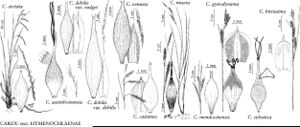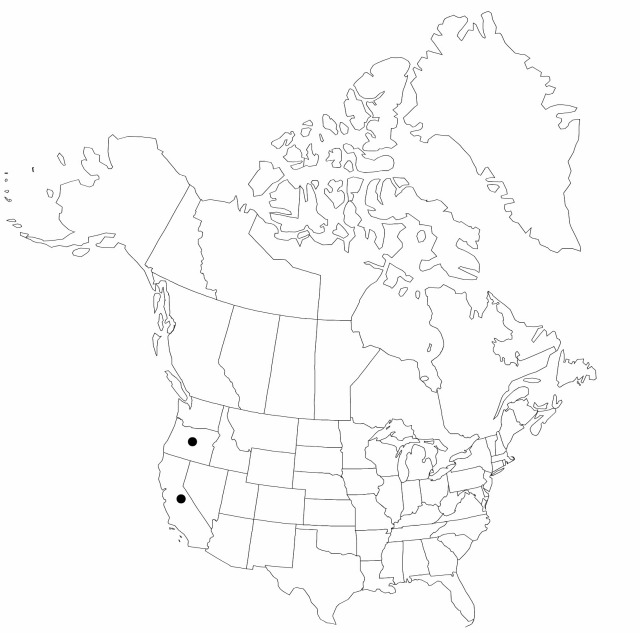Difference between revisions of "Carex mendocinensis"
in S. Watson, Bot. California 2: 249. 1880.
FNA>Volume Importer |
FNA>Volume Importer |
||
| Line 30: | Line 30: | ||
|elevation=100–1600 m | |elevation=100–1600 m | ||
|distribution=Calif.;Oreg. | |distribution=Calif.;Oreg. | ||
| − | |discussion=<p>Occasional sterile hybrids between Carex mendocinensis and C. gynodynama are found where the species grow together. Specimens from the northern part of the range tend to have pubescent leaf sheaths and perigynia that taper more gradually to the beak.</p> | + | |discussion=<p>Occasional sterile hybrids between <i>Carex mendocinensis</i> and <i>C. gynodynama</i> are found where the species grow together. Specimens from the northern part of the range tend to have pubescent leaf sheaths and perigynia that taper more gradually to the beak.</p> |
|tables= | |tables= | ||
|references={{Treatment/Reference | |references={{Treatment/Reference | ||
| Line 57: | Line 57: | ||
|publication year=1880 | |publication year=1880 | ||
|special status= | |special status= | ||
| − | |source xml=https://jpend@bitbucket.org/aafc-mbb/fna-data-curation.git/src/ | + | |source xml=https://jpend@bitbucket.org/aafc-mbb/fna-data-curation.git/src/8f726806613d60c220dc4493de13607dd3150896/coarse_grained_fna_xml/V23/V23_864.xml |
|genus=Carex | |genus=Carex | ||
|section=Carex sect. Hymenochlaenae | |section=Carex sect. Hymenochlaenae | ||
Revision as of 16:11, 18 September 2019
Plants densely cespitose. Culms dark maroon at base; flowering stems 25–80 cm, much longer than leaves at maturity, 1–1.8 mm thick, glabrous but scabrous on angles, especially within inflorescence. Leaves: basal sheaths maroon, bladeless, glabrous on back; others grading from maroon to green on back, brown-hyaline and usually red dotted on front, glabrous or often pubescent near apex; blades flat, 2.5–5.5 mm wide, usually less than 4 mm wide, glabrous or sparingly rough-hispidulous on 1 or both surfaces, margins scabrous, especially distally. Inflorescences: peduncles of proximal spikes 0–65 mm and finely scabrous; peduncle of terminal spike 0–12 mm, scabrous; proximal bracts equaling or exceeding inflorescences; sheaths 8–40 mm; blades 1–4 mm wide. Lateral spikes 3–5, 1 per node, well separated, erect or arching at maturity, pistillate with 20–45 perigynia attached 0.5–2 mm apart, rarely the distal staminate, linear to narrowly cylindric, 10–60 × 2.5–6 mm. Terminal spike staminate, rarely with a few perigynia, sessile or pedunculate, 18–38 × 1.2–4 mm. Pistillate scales with green midrib and broad pale hyaline margins suffused with reddish or golden brown, broadly ovate, shorter than mature perigynia, apex acute to rounded, sometimes cuspidate, margins ciliate distally, otherwise glabrous. Perigynia green to golden green, usually blotched or dotted with dark red, 2-ribbed and finely 12–15-veined, veins more obvious on abaxial side, loosely enveloping achene, oblong-lanceolate, 2.7–5 × 0.8–1.8 mm, membranous, base acute, apex tapering to beak, sparsely pubescent toward apex; beak minutely bidentate, 0.3–1 mm, ciliate between apical teeth. Achenes sessile, 1.6–2.5 × 0.9–1.5 mm. 2n = 56, 58, 60.
Phenology: Fruiting late spring–summer.
Habitat: Seepage areas, wet meadows, coastal prairies, springy slopes, mixed evergreen forest, associated with serpentine soils near the Pacific Coast
Elevation: 100–1600 m
Discussion
Occasional sterile hybrids between Carex mendocinensis and C. gynodynama are found where the species grow together. Specimens from the northern part of the range tend to have pubescent leaf sheaths and perigynia that taper more gradually to the beak.

